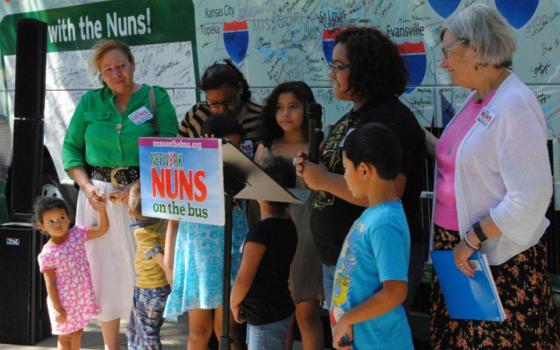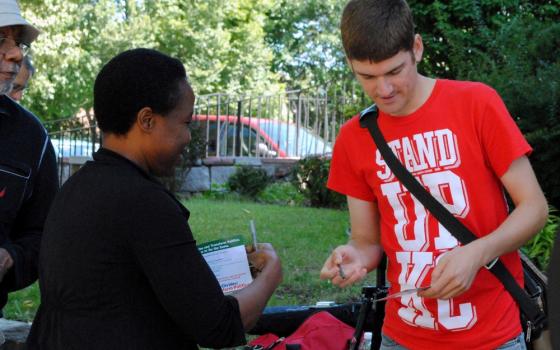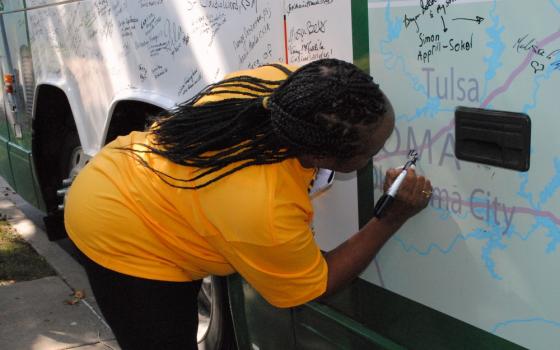Homemade granola and a bilingual greeting welcomed the Nuns on the Bus on their second stop in a 13-city tour of the U.S. centered on bridging divides and transforming the nation's political discourse and direction.
After hearing of economic and racial injustices Thursday in St. Louis, the seven women religious on the bus stopped outside St. Anthony Parish in north Kansas City on Friday, Sept. 11, where a crowd approaching 100 people shouted "Welcome, sisters!" in unison but in their native languages.
St. Anthony pastor Fr. Paul Turner told the crowd — in English and Spanish — that the church was built in the 1920s largely by Italian immigrant families.
"We've been a home for immigrant families throughout our history and still are today," he said.
The plight of immigrants to the United States played a central theme in the Kansas City stop.
"We need immigration reform," said Rosa Parra, who gained U.S. residency through a U visa, which is provided to victims of crimes that bring about mental or physical abuse.
She noted that the last major immigration reform came in 1996 with the passage of the Illegal Immigration Reform and Immigrant Responsibility Act. Parra said she is using her legal status to stand up for those seeking the same opportunity and struggling to keep their families together.
"I hope that Congress hears this voice," she said. "It's a plea today for all the Congress to be one. America needs to be united. We don't need to be divided."
The reality of broken families hit home when Katherine, 15, described how her parents were deported to Honduras in May, leaving her grandmother to care for her and her five younger siblings. The separation has been difficult for their family, she said, leading her 11-year-old sister to attempt to take her own life.
"I thank God that she's still here with us," she said. "But we're still fighting. And all we want is for our parents to be with us, because they're like the roots to a tree, and a tree without roots dies slowly."
Dominican Sr. Bernadine Karge, one of the Nuns on the Bus, told GSR that Katherine's story "breaks my heart," but it is reminiscent of stories she heard in Chicago working as an immigration attorney.
"Why can we not allow families to be here? I mean, America needs immigrants, we always have," she said, adding that they bring a new and necessary energy to the nation.
An example of such energy, Karge said, was Juan Diego Sanchez, a Mexican-born student in the country under the Deferred Action for Childhood Arrivals, who at age 18 obtained his business license and started his own construction company.
"I did it not only to benefit me, but to benefit my parents and my family. To overcome these obstacles that were put in front of us," Sanchez told the crowd outside the church.
DACA permits children of immigrants who entered the U.S. illegally to remain in the country temporarily and to apply for a work permit. President Barack Obama established DACA in June 2012 and attempted to expand it by executive order in November 2014; a federal court in Texas has put a temporary hold on that order.
Sanchez thanked the president for his executive action. He said as an undocumented student, he has seen the many obstacles placed before him and his family, including living in fear of being pulled over and deported and people taking advantage of his father, a roofer, by not paying him, with one person at one point owing him $10,000.
Karge said stories like Sanchez's are necessary to push back against narratives that cast immigrants as lazy or as criminals, especially since they have gained traction in the course of the current presidential election cycle.
"To see his face looks like your face and my face, and the same blood runs through our veins and the same breath of God is in our bodies, and we want to be the best people we can be and be of service to the community — and that's what I see over and over again," she said.
Though it is early in the tour, Karge said a theme that has developed from the stories the sisters have heard is one of the struggle of people to support their families.
"It's the whole thing of the family being torn apart: by bad immigration laws, by gun violence, by police brutality. It's like, why can we not see the humanity in each other and struggle together to have this for everybody, no matter what color their face is?" she said.
In addition to hearing about immigration, the sisters heard from a fast-food worker and a home health care worker.
Mikela Houston has worked at Taco Bell for a year and half. The $11.25 she earns each hour, while above the minimum wage, still doesn't allow her to pay her bills on time and support her son without government assistance. She joined the nationwide fast-food worker push for $15 an hour in part "because I didn't have anything to lose."
"We're people just like everyone else, and we deserve a living wage," Houston said.
The crowd gasped when Jeanette Hutchinson, a home health care worker since age 17, said she works a total of 90 hours a week, taking care of three people through two agencies in addition to working a full-time weekend job.
"I never have a day off, unless I'm in the hospital sick. Because if I miss work, I miss my pay. I could use a rest. . . . One full-time job should be enough," she said.
Social Service Sr. Simone Campbell thanked the speakers for their stories and encouraged them to join the sisters as "missionaries for the common good."
No one should have to work three jobs, Campbell said. "Even the Nuns on the Bus can't work 90 hours a week."
[Brian Roewe is an NCR staff writer. His email address is [email protected]. Follow him on Twitter: @BrianRoewe.]


